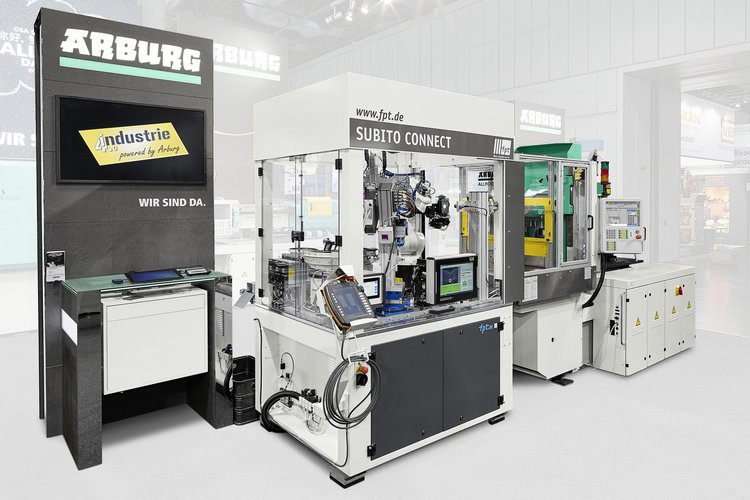Economically efficient production of "smart" luggage tags
The "smart luggage tag" shows how such "mass customisation" can be achieved relatively simply by combining injection moulding and additive manufacturing without sacrificing the efficiency and cost-effectiveness offered by high-volume production. An Allrounder injection moulding machine, a Freeformer for industrial additive manufacturing, as well as automation and IT solutions from Arburg form a flexible cyberphysical production system.Using an individual NFC chip, the injection moulded product produced on an Allrounder becomes the data and information carrier and controls the further production operations to become a one-off part. It communicates with the machines at the various production stations, knows its own history and current status, as well as navigating its own path through the process chain. The individual plastic design is applied in an additive process using the Freeformer.
A central element here is integration with Arburg's proprietary ALS host computer system. This records the product, process and quality data and transmits it to a web server. In the "luggage tag" example, each part has its own website. The data for each component can be retrieved and traced at any time, even after many years. Digital networking through the host computer system promotes transparency and consistency and facilitates the optimum utilisation of the full production capacity, particularly in the case of smaller unit volumes and frequent product changeovers.
"100 Centres of Industry 4.0 Excellence in Baden-Württemberg"
The aim of the "Industry 4.0 Alliance for Baden-Württemberg" network initiative is to pool expertise in production technology, as well as information and communication technology, to bring together all key players and to encourage small and medium-sized enterprises in industry to move towards Industry 4.0 through innovative information-sharing initiatives.The "100 Centres of Industry 4.0 Excellence in Baden-Württemberg" competition seeks to identify innovative concepts in industry that have succeeded in the intelligent networking of production and value-added processes. As well as examining the level of innovation, the panel of expert judges also assesses specific practical relevance with regard to Industry 4.0. To date, a total of 84 companies, institutions and other organisations have been presented with a certificate and a glass plaque in five award rounds. This number is to reach 100 over the course of 2017.

Arburg received the "100 Centres of Industry 4.0 Excellence in Baden-Württemberg" award because its products enable flexible high-volume production in batches as small as a single unit. Photo: ARBURG




